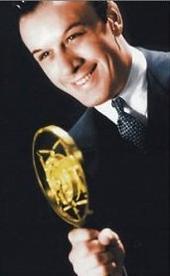Join the Russ Columbo Group on Yahoo where you can find photos, information and music. Check it out!. Click on the link below.
Click to join russcolumbo
Ruggiero Eugenio di Rodolpho Colombo (January 14, 1908-September 2, 1934), better known by the name Russ Columbo, was an American singer, violinist and actor, most famous for his signature tune, "You Call It Madness, But I Call It Love," and the legend surrounding his early death.Columbo was born in Camden, New Jersey, the twelfth child of Italian immigrant parents. He started playing the violin while still very young, and debuted professionally at the age of 13. He left high school at 17 to travel with various bands around the country. He sang and played violin in numerous nightclubs.
By 1928, at the age of 20, Columbo began to participate in motion pictures. In several of his early films, his voice and violin were overdubbed to create the illusion that various popular entertainers were musical. Eventually, he did obtain some feature work in front of the camera, but he slowed down his activities in cinema to pursue other interests.
Columbo tried to run a nightclub for a while, but the venture was unsuccessful. In 1931, he traveled to New York with his manager, songwriter Con Conrad. Conrad secured a late-night radio slot with NBC. This led to numerous engagements, a recording contract with Victor records, and tremendous popularity with legions of mostly female fans. The type of singing that was popularized by the likes of Columbo, Rudy Vallee, and Bing Crosby is called crooning. Columbo disliked the label, but it caught on with the general public. It gained popular credence, despite its initial use as a term of derision for the singers employing their low, soothing voices in romantic songs.
On September 2, 1934, Columbo was shot under peculiar circumstances by his longtime friend, photographer Lansing Brown. Columbo was visiting him at the studio one day. In lighting a cigarette, Brown lit the match by striking it against the wooden stock of an antique French dueling pistol. The flame set off a long-forgotten charge in the gun, and a lead pistol ball was fired. The pistol ball ricocheted off a nearby table and hit Columbo in the left eye, killing him almost instantly. Columbo's death was ruled an accident, and Brown exonerated from blame.His mother was never told of his death. Family and friends made her believe that her son was on a world tour by sending postcards addressed from Russ. She lived the remaining 10 years of her life thinking he was still alive.
During his brief, spectacular four year career - 1931-34 - Columbo appeared in several films and had a hand in writing several songs. Virtually all of Russ' recordings became some of the most popular songs of the early 1930's. Among his best-known recordings are:
1930 "Time on My Hands"
1931 "Prisoner of Love"
1931 "You Call It Madness", his theme song.
1931 "Sweet and Lovely"
and others include:
"Goodnight Sweetheart,"
"All of Me"
"You're My Everything"
"Paradise"
On August 31, 1934, just two days before his death, he recorded:
"I See Two Lovers".His film credits include:
Wake Up and Dream (1934); Moulin Rouge (1934) (as Himself); Broadway Through a Keyhole (1933); That Goes Double (1933) (as himself); Hell Bound (1931); The Texan (1930) (uncredited); Dynamite (1929) (uncredited); Wonder of Women (1929) (uncredited); Street Girl (1929) (uncredited); The Wolf Song (1929); Gus Arnheim and His Ambassadors (1928) (uncredited/himself-vocalist).
This profile was edited with Thomas' Myspace Editor V3.2b
